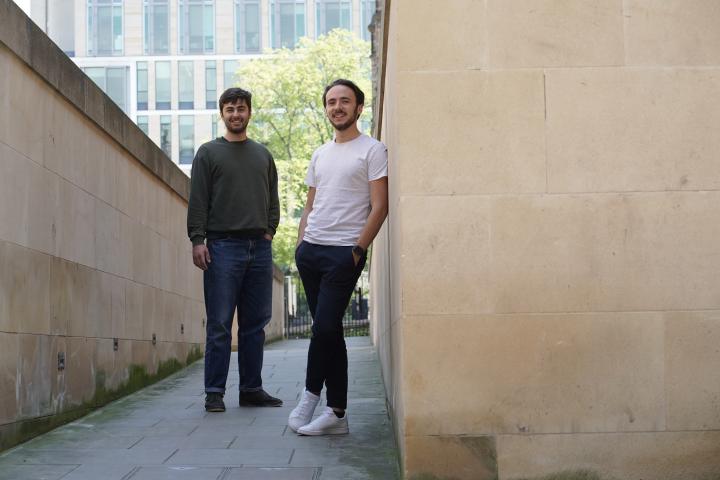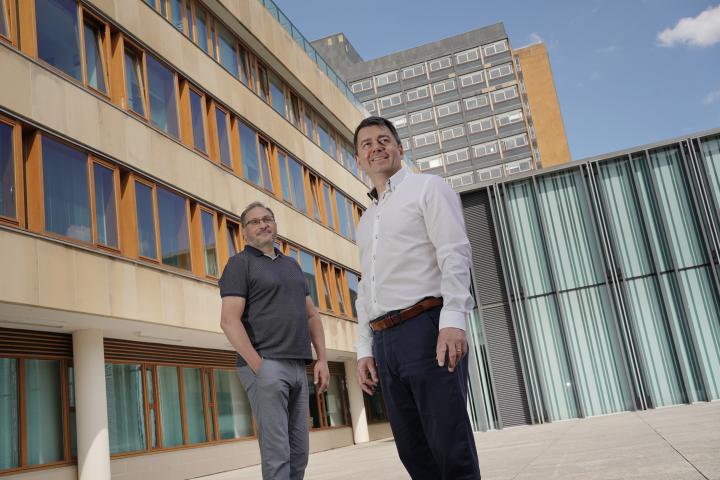Together we stand
How data entrepreneurs are getting business back on its feet and on the path to post-Covid recovery with support from the University.
While the past 18 months has been a period drenched in uncertainty and fear for so many, a new generation of business leaders has been taking the next steps to ensure society bounces back from the pandemic stronger than ever before.
At the vanguard of that recovery are entrepreneurs from across Scotland who have put technology and data at the heart of their new businesses. They aren’t doing it alone, though. An innovative entrepreneurial programme from the University is providing a helping hand, working with more than 700 students, staff and businesses since its inception at the start of 2021.

A beacon for businesses
The Data-Driven Entrepreneurship (DDE) Beacon Programme is playing its part in shaping the post-pandemic recovery in Edinburgh and beyond. A collaboration between the University’s Data-Driven Innovation Hubs and its commercialisation service, Edinburgh Innovations, the DDE programme is designed to help fledgling entrepreneurs build their skills and take their businesses to the next level.
The hubs – Bayes Centre, Edinburgh Futures Institute, Usher Institute, Easter Bush, National Robotarium, and the Edinburgh International Data Facility – are innovation centres with a focus on supporting sectors like healthcare and financial services to become more innovative through the use of data.
The hubs’ expertise, world-leading facilities,and research capabilities are all available to businesses looking to make an impact as we look towards a post-pandemic future.
“The DDE Programme is the culmination of the University’s rich history of facilitating entrepreneurship,” says Charlotte Waugh, Enterprise and Innovation Programme Lead at Edinburgh Innovations. “Given the challenges our society faces in bouncing back from the impact of Covid-19, it has never been more important to instil and foster an entrepreneurial mindset across the University. Society needs solutions and the University’s expertise in data, technology and business development means we are perfectly positioned to help businesses make an immediate difference.”
The entrepreneurial journey
With £1.3 million in funding from the Scottish Funding Council, the DDE programme supports budding entrepreneurs through 12 individual programmes, designed to provide a more cohesive entrepreneurial journey.
These range from the Graduate Enterprise Grant, which gives graduates access to £5,000, to the Fast Track Executive Director initiative, which connects founders who are looking to develop a company at speed that is related to their research.
The AI Accelerator programme, meanwhile, is tailored towards businesses looking to play an important role in society’s recovery from the pandemic. Based at the Bayes Centre – the University’s innovation hub for data science and artificial intelligence (AI) – the initiative supports data-driven businesses who see AI as the way to bring about significant change in how things are done in their sector.
Companies on the programme have access to workshops and dedicated mentors, are given a stipend of £9,000, and have a direct line to the University’s leading academic expertise and student talent.
Biosafe buildings
One such company to benefit from the initiative is Data Innovation.AI. Set up in June 2020 in response to the pandemic, the business uses AI and 3D modelling to assess the biosafety of new building designs.
Their technology simulates Covid-19 emission, transmission and infection within a prospective workplace, giving building designers valuable insight into how to minimise the risk of disease transmission.
“We understood that washing your hands and singing ‘Happy Birthday’ wasn’t going to quite cut it,” explains Chief Operating Officer, Craig Fenton. “Covid-19 highlighted a problem in the construction industry that buildings are designed with aesthetics and comfort in mind, not biosafety for occupants. Our goal is to help design buildings that are more biosafe and reduce the risk of disease and infections for people.”
An important feature of their early success was the support of the AI Accelerator programme, which gave them access to University facilities and research.
EPCC – a world-class supercomputing centre based at the University – supported their simulation tools, while their work with UNCOVER – a network of population health researchers and information specialists providing Covid-19 evidence reviews for policymakers – helped shape the platform’s epidemiological modelling.
“Navigating an institution the size of the University of Edinburgh can be difficult so to have doors opened for you is fantastic,” Craig adds. “The amount of knowledge, experience and resources available to us through the AI Accelerator has been so important to us in the early stages of getting our business off the ground.”

An appetite for success
Another burgeoning business to have benefitted from the DDE programme is NextChain – an online ordering platform for professional kitchens and food suppliers. Designed by two University of Edinburgh graduates in response to the impact of Covid-19 on the hospitality industry, the app provides restaurants and suppliers with the tools to work more closely together, reducing valuable time spent on tasks like placing orders and processing invoices.
“Restaurants say the way they work with their suppliers is a flawed process,” co-founder and Finance, Technology & Policy graduate Gauthier Collas explains. “At NextChain, we work with restaurants and their suppliers to optimise the food chain, taking time, money and stress out of daily activities and allow food industry professionals to focus on what they do best.”
Financial support from the DDE programme allowed Gauthier and co-founder Armin Ghofrani, Computer Science & Mathematics graduate, to develop an innovative platform that already has a growing number of users. It also provided them with the opportunity to hire an additional team member, which proved crucial in helping them meet the early demand for their product.
Edinburgh for entrepreneurs
Their business forms part of a thriving tech start-up scene in Edinburgh; one which Gauthier, who is originally from France, cites as one of the most vibrant he has been involved in.
“I have travelled and worked in different countries and Edinburgh really does have an incredible entrepreneurial ecosystem, particularly at the University,” he says. “My advice to anyone who is thinking about starting a business would be to get in touch with DDE, who will help you find the best support available to you. There are so many ways to access amazing support from the University.”
Charlotte agrees with Gauthier’s assessment of the business landscape in Scotland and believes the DDE programme is perfectly positioned to help fledgling businesses take flight.
“The programme has expanded in direct response to the impressive growth of data-driven innovation and entrepreneurship across Edinburgh and Scotland as a whole,” she says. “There’s little doubt that the support, advice and industry contacts provided by the DDE programme can help new businesses swiftly start making a significant impact on people’s lives.”
Find out more
Written by Guy Atkinson, PR and Media Manager, Communications and Marketing, The University of Edinburgh.
Photography by Stewart Attwood for DDE.

